The purpose of this research was to investigate the perceptions of refugee children, refugee parents and school staff regarding what they believe contributed to the positive adaptation of refugee children after facing adversity. This research examined how the participants understood the factors inherent in the new social milieu and its effect on refugee children’s mental health and psychological well-being. This included an exploration of resilience and the role of risk and protective factors. Few studies have focused on exploring views from a resilience perspective and studies that have, have also tended to focus on exploring factors through quantitative rather than qualitative measures. This mixed methods piece of ‘real world’ research, adopted a ‘what’s working well’ perspective, aimed to explore the important voices of children, parents and staff. The views of three refugee parents and twenty one refugee children aged between 9 and 19 years old, of various ethnic origins and length of stay in the UK (six months to eight years) were explored through semi-structured interviews. Data were analysed using a thematic analysis approach. The children’s level of well-being in different domains such as school was assessed using the Multidimensional Student Life Satisfaction Survey (Huebner, 2001). The views of sixty-three staff members were also gathered via questionnaire. Findings from this research reveal the valuable perspectives parents and young people can offer. The psychological construct of resilience was of relevance to the children in the present research, with several themes reflecting factors that have been shown to impact on resilience in positive or adverse way. Young people’s comments suggested that they were not protected from all negative experiences, but were able to succeed in the face of such adversity due to a number of factors that provided a defence against it. The key differences that children identified, that could be protective as well as a risk for them featured in the following main themes: factors within the family, experiences at school and individual/personal characteristics. Staff, parent and child responses were triangulated to provide a rich picture of the potential protective factors operating within the school and family environment. Implications for future practice for schools and Educational Psychologists in areas such as the voice of the child, bullying, home-school and community partnerships and mental health interventions are discussed. Methodological issues are also considered, together with suggestions for future research to create a deeper understanding of the role of culture, schools, coping styles and the community. Further opportunities for research exploring risk and resilience in unaccompanied refugee children are suggested.
Search Results for “2024 Newest SHRM SHRM-SCP Test Vce Free 🩺 Go to website { www.pdfvce.com } open and search for ▷ SHRM-SCP ◁ to download for free 👓SHRM-SCP New Dumps Book”
Bullying is currently a very emotive and well-publicised issue, featuring frequently in TV programmes and newspapers. It is no longer accepted as an inevitable part of school life affecting only weak and inadequate victims, but, instead, as a social ill, with long-term psychological effects on both bully and victim, that needs to be eradiated from schools and work places. This research project provides a detailed exploration of fictional representations of bullying in contemporary teen fiction. It approaches the main research question, “How is Bullying Presented in Contemporary Teen Fiction”? through four subsidiary research questions and interviews with some of the writers in the desk study, against a background of children’s/adolescent literature criticism and psychological, sociological and educational research on bullying in schools. Thus, the research project utilises current academic thought in two different fields: English and Education. Through the first subsidiary question, the patterns in the presentation of bullying are explored. Issues of gender, modes of aggression and types of bullying (racial, sexual and organisational) are discussed. The focus of the research narrows into examining the construction of the bully and victim experience through the second and third subsidiary research questions respectively. Contemporary presentations are compared with the presentations in generic boys’ and girls’ school stories and considered in the light of current thinking in bullying research. The fourth subsidiary research question refocuses the research on the narrative design of novels in the desk study by exploring the common strategies writers use in narratives dealing with bullying and the nature of the resolutions to ending the bullying relation offered to readers. These are considered further as Entwicklungsroman through adolescent literature criticism and notions of adolescent growth, power, maturation and alienation.
I conducted two pieces of research, the first using a method known as discourse analysis, the second interpretative phenomenological analysis (IPA). The form of discourse analysis which was employed takes as its focus the analysis of verbal or written reports as behaviours in their own right. This was applicable to my first research project, which looked at the construction of a crisis in male mental health as represented in a series of newspaper articles. A position is taken that an awareness of the discourses surrounding masculinity is necessary for therapists who seek to help men with problematic enactments. I have been interested in this area since my involvement with research into male suicide. During the final year of my course I picked up the thread of this work in a review of the literature which explored how masculinity was theorized, including a focus on hegemonic constructions of masculinity and the implications for therapy. For example, it was suggested that seeking therapy itself conflicts with predominant enactments of masculinity. In addition there was an exploration of theoretical frameworks which might be appropriate for working with men. The use of IPA in my second research project links with the use of discourse analysis in the recognition of the importance of context and language in the shaping of the material gained. However, unlike discourse analysis, there is an attempt to gain an understanding of underlying cognitions in individual participants. The study looked at the subjective experiences of woman who had been bullied in childhood as represented in retrospect accounts obtained by interview. It was hoped to begin to address an inbalance in the research which had focused predominantly on the male experience, perhaps reflecting a general belief that bullying is more common amongst boys. I was interested in gaining insight into the memories of the bullying itself and its context and also into the meaning of the experience for the participants in terms of their developing selves.
This thesis considers how sexual and romantic relationships between academic faculty and students in higher education are governed. Using analytic techniques drawn from Foucault and discursive psychology to interpret a corpus of texts, which includes policy documents, interview transcripts, fictional accounts, newspaper articles, and computer mediated discourse, I explore how five discourses are mobilized to frame faculty student relationships. I find that harassment discourse, which emerges as the dominant frame of reference in scholarly accounts, is taken up less readily in the accounts studied here. Rather, discourses foregrounding four alternative, but often imbricated, themes are more extensively mobilized: infantilization; religiosity; health, safety, and hygiene; and professionalism. These discourses reinforce elements of the truth claims propounded by harassment discourses; notably, their gendered and heterosexist assumptions, and their insertion of a gap between academic and student, albeit one configured along subtly different lines. However, they also challenge them, positing alternative claims to truth, recasting the subject positions of academic and student, and re-orienting relations between the two. For example, infantilization discourses construct faculty-student relationships as a horrific relation between adult or parent and child which must be monitored, whereas religious discourses construct a pastor-flock relation, articulating relationships as a temptation to be resisted or atoned for. The thesis offers contributions to research on faculty-student relationships per se, and is also understood as opening up analysis of organizational sexuality and the university more generally by arguing for the usefulness of a government approach to these phenomena.
This thesis explores how digital technologies such as social media, smart devices and gaming platforms are shaping young people’s sexual cultures. While the majority of research on young people’s digital sexual cultures has maintained a narrow focus on risk and harm, and limited what digital practices are considered relevant and for whom, this thesis contributes to a growing body of scholarship that seeks to support children and young people to navigate the complexities of an ever-changing digital sexual age. I worked with a socio-economically and culturally diverse sample of twenty-five young people aged 11 – 18 years from England and Wales. Rather than focusing on a pre-defined set of digital practices, I set out to foster a creative, curious and open-ended approach that allowed participants to identify which digital practices mattered to them. Over a period of fifteen-months, I employed a range of creative, visual and arts-based methods in group and individual interviews to explore a flexible set of core issues including digital worlds, relationships, networked body cultures and media discourses. Taking inspiration from feminist posthuman and new materialist concepts of ‘assemblage’, ‘affect’, ‘phallogocentricism’ and ‘feminist figurations’, I trace normative articulations of gender and sexuality as well as activate different ways of seeing and relating to young people’s digital sexual cultures. My data highlights the enduring force of heteronormative and phallogocentric power relations in young people’s digital sexual cultures through the publicisation of intimate relations online, social media’s visual culture of bodily display and gendered harassment online. However, it also maps ruptures and feminist figurations that displace vision away from the heteronormative and phallogocentric mode. I illustrate how young people’s digital sexual cultures can be the site of unexpected and unpredictable relations that move beyond normative notions of (hetero)sexuality and towards possibilities for re-imagined sexualities that exceed heteronormative and phallogocentric norms.
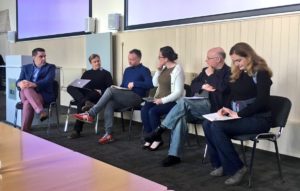
ABC participated in the BPS Cyberpsychology #CyberSectionChat on the topic of Cyberbullying this month.
The British Psychology Society (BPS) Cyberpsychology (@BPSCyberPsych) section discusses various ‘cyberpsychology’ related topics each month for their #CyberSectionChat. Researchers and industry advocates who study the application of psychology to digital technologies and the Internet (cyberpsychology) tweet about their views, tips and research/industry/practitioner experience during the chat. January’s topic was on Cyberbullying, and ABC were delighted to be involved.
The chat consisted of tweeters addressing 6 questions about cyberbullying: 1) Should cyberbullying and traditional bullying be seen as separate phenomena? 2) What is the most serious societal or individual level impact of cyberbullying? 3) Who is most likely to be targeted for cyberbullying? Are all age groups vulnerable in the same ways? 4) What are the shortcomings in cyberbullying research that should be prioritised in future? 5) What are the key barriers to addressing cyberbullying? What interventions could address these? and 6) How can we increase resilience to cyberbullying?
Dr. Dawn Branley-Bell of Northumbria University tweeted on the characteristics that might distinguish ‘traditional’ bullying from cyberbullying.
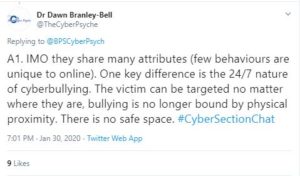
Dr. Peter J. R. Macauley, lecturer in social psychology at Staffordshire University, tweeted about the negative consequences of cyberbullying for all involved addressing the individual and the wider society.
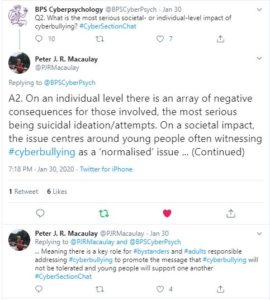
Dr. Maša Popovac, lecturer at the University of Buckingham tweeted on some of the ways resilience to cyberbullying could be promoted via digital citizenship and online safety education.
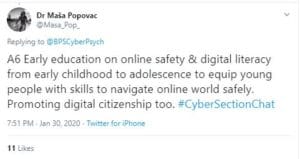
Dr. Linda Kaye, senior lecturer at Edge Hill University commented on how the dynamics of online spaces can change how bullies target victims differently to how they would in ‘traditional bullying’.
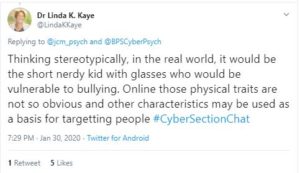
It was also important to critique some of the ways that researchers measure cyberbullying, particularly in relation to quantitative measures that are widely used. So ABC did just that.
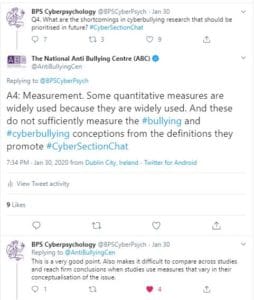
There were other fantastic tweets from other contributors too – apologies for not mentioning them all here! It was certainly stimulating to discuss such issues in relation to cyberbullying and engage with researchers who follow similar interests in promoting online safety, and making the online world a safer place for all concerned. ABC expresses many thanks to the committee behind BPS Cyberpsychology who organised the chat (also ABC won a contributor award XD). To visit the #CyberSectionChat, readers can access all of the tweet contributions on Twitter here.
This dissertation examines the effect of stress on the service quality of the call centre employees. Stress is a much known phenomenon in every industry, but in this dissertation the researcher evaluated its impact on call centre employee’s service quality performance. It has been widely recognised that stress at work can result in a host of adverse outcomes for both employees and organisations (Nigam et al, 2003). The literature related to the stress and its impact on service quality in call centre industry will explored many factors and situations which work as job stressors in call centre industry and how they affect the service quality. The following research also focuses on the issues related to employee safety and health and how those stressful conditions making employees emotional exhausted. The study also sought various management interventions to find the solution for the stress reducing schemes in order to give relief to its employees so they can perform in much better environment. The research methodology used in this dissertation includes research philosophy, research approach, and research strategy, sampling design and data collection methods. The data was collected by using quantitative questions questionnaires which will help researcher to reach a conclusion. Based on the data analysis findings, conclusion has been drawn which will help to support the laid hypothesis of the research. Recommendations also have been made on the basis of result generated for future research in the same area and also guiding the management to take recommended action to sort out the problems related to stress in call centre industry.
In a significant development for educational and psychological research, Dr. Ashling Bourke and Dr. Sinéad McNally have been appointed as Dean’s Research Fellows with ABC, a prestigious fellowship program supporting groundbreaking studies. Their respective research projects, focusing on different aspects of bullying and social behaviour, are poised to make impactful contributions to understanding and addressing critical issues in education and society.
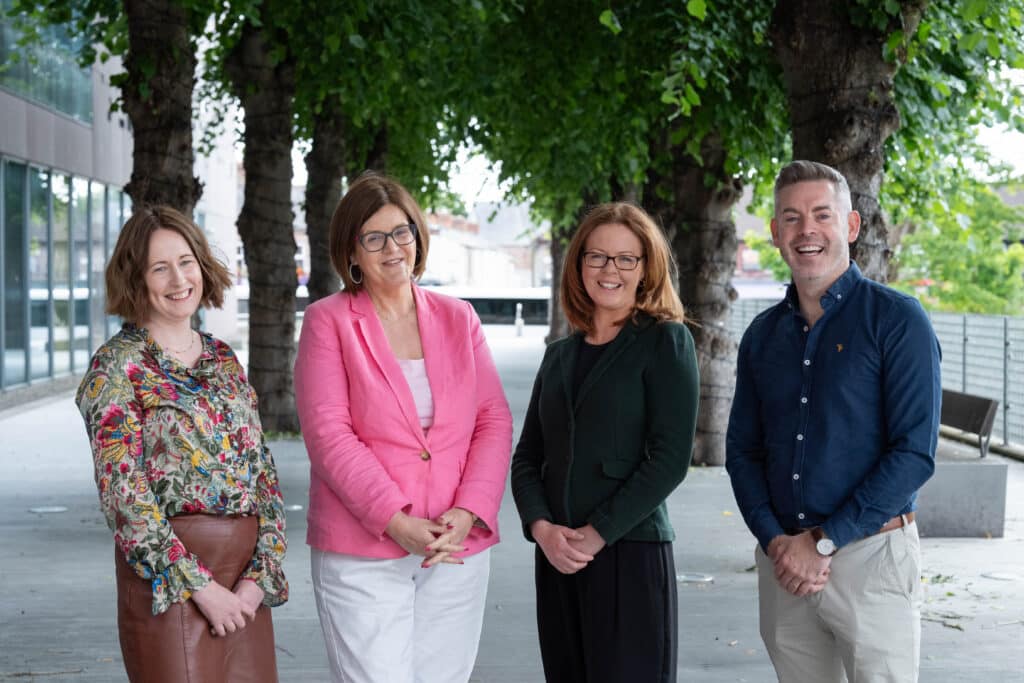
Dr. Ashling Bourke’s Study on Social Dominance Orientation and Cyberbullying
Dr. Ashling Bourke will be conducting a study on the role of Social Dominance Orientation (SDO) and its relationship with empathy in the perpetration of cyber bullying behaviour. SDO is a narrow personality trait encompassing an individual’s tendency to accept and endorse group-based social hierarchies and the extent to which they desire their in-group to be superior to out-groups. Dr. Bourke’s research will examine how this orientation relates to the perpetration of cyberbullying and will investigate the role of empathy as a moderating factor. Her project will involve a rapid systematic review of the literature and a quantitative cross sectional examining cyber bullying behaviour (CBB), the propensity to accept social hierarchy myths (SDO) and cognitive empathy.
Dr. Sinéad McNally’s Research on Autistic Children’s Experiences of Bullying
Dr. Sinéad McNally’s fellowship will focus on exploring the lived experiences of autistic children who face bullying and exclusion within school environments. Her research aims to shed light on the specific challenges that autistic pupils encounter in both primary and secondary educational settings. By delving into the personal narratives and experiences of these children, Dr. McNally seeks to identify actionable supports that can be implemented to enhance the educational experiences of autistic students.
Both fellows are expected to make substantial contributions to their respective fields, and their work under the ABC fellowship will undoubtedly inform future research and practices aimed at reducing bullying and promoting empathy in various social contexts.